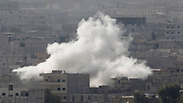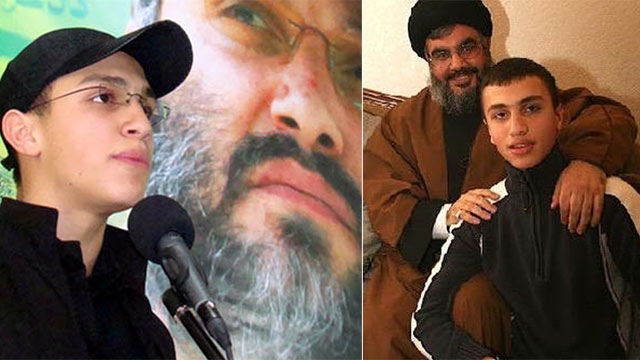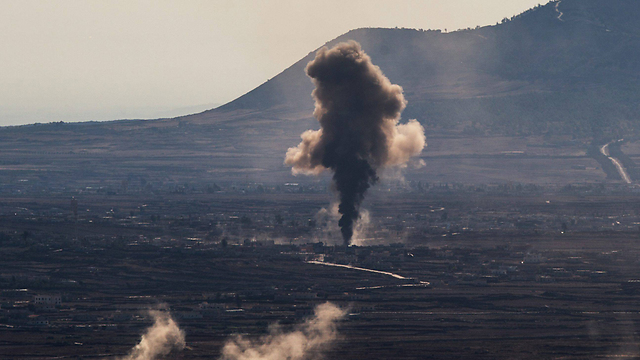
Jihad Mughniyeh killed in alleged Israeli strike in Quneitra
Imad Mughniyah's son, Hezbollah's commander in the Syrian Golan Heights, was killed alongside 4 other Hezbollah men when Israeli missiles hit Syrian village bordering Lebanon, according to Lebanese media; unnamed Israeli source says strike targeted terrorists planning attacks against Israel, while IDF declines to comment.
Jihad Mughniyeh, Hezbollah's commander of the Syrian Golan sector and the son of Lebanese terrorist Imad Mughniyah, was killed on Sunday when an Israeli helicopter reportedly fired two missiles in the Syrian province of Quneitra near the Israeli Golan Heights, according to Lebanese media. Mughniyeh the father was assassinated in 2008.
Lebanese media reported that IAF helicopters have fired rockets at a Syrian village of Quneitra not far from the border with Lebanon.
Four other Hezbollah fighters were killed in the strike, among them field commander Mohammad Issa, who goes by the nom de guerre "Abu Issa"; the Iranian Commander in the Syrian Golan Heights Abu Ali al-Tabtabai, also known as "Abu Ali Reza"; and Ismail al-Ashhab.
Hezbollah said in a statement its men were on a field reconnaissance mission in Quneitra.
A Syrian activist said Hezbollah was widely rumored to be training pro-Assad militiamen and Syrian government forces near the area of the strikes. The activist, who uses the name Abu Omar, said the tiny community was close to rebel positions, and that they had obtained the information from people there.
A reporter from the Hezbollah journal al-Akhbar wrote on his Twitter page that "the Hezbollah leadership is the one that will decide how to respond to the recent Israeli aggression, however this blow is uncontainable."
Syrian Minister of Information Omran Ahed Zoabi told Al Manar that "Israel has made a grave mistake in attacking in Syria. The strike exposes further how it cooperates with terror organizations and Jabhat al-Nusra."
A Syrian military official told Al Manar that "an Israeli helicopter launched two missiles at the village of Mazrat al-Amal in the outskirts of Quneitra. As a result, six jihad fighters were killed and a boy was wounded."
The report was unconfirmed by the IDF, which said in response: "We do not respond to foreign reports."
An unnamed Israeli official, however, confirmed the attack, telling AFP the raid targeted terrorists planning attacks against Israel. Speaking on condition of anonymity, the Israeli source could not say neither the identity of the target nor the exact nature of the attack they were planning. Lebanese MTV television station said the airstrike was an attempt to target a cell planning to fire rockets at Israel.
According to Al Maydeen, Israeli forces hit a convoy traveling near the village, a hotly contested site in the Syrian civil war, with al Qaeda affiliated rebels battling pro-regime forces for a nearby border crossing which connects Syria and Lebanon.
"An Israeli helicopter fired two missiles on Amal Farms in Quneitra," the Lebanese news channel said, adding that two reconnaissance planes were also flying over the area.
Hezbollah fighters in towns and villages along the border with Israel went on high alert, said an official from the group. In the Shiite-dominated areas of south Lebanon and Beirut the streets emptied quickly, as residents feared an escalation. Hezbollah-run al-Manar TV warned that Israel was "playing with fire that puts the security of the whole Middle East on edge."
The Al Maydeen report said that the missiles were fired at vehicles belonging to the National Defense Force, a part-time volunteer reserve component of the Syrian military, organized by the Syrian government during the civil war. Lebanese newspaper The Daily Star quoted Lebanese sources as saying the strike entirely destroyed one Hezbollah vehicle and damaged another.
The Syrian Observatory for Human Rights, a Britain-based group monitoring the civil war, said the missiles fired on Sunday targeted armed vehicles, citing local sources. It said it did not know if the vehicles belonged to the army, Hezbollah or anti-Assad insurgents.
Hezbollah chief Hassan Nasrallah threatened in an interview Thursday to retaliate against Israel for repeated strikes on Syria: "The repeated bombings that struck several targets in Syria are a major violation, and we consider that any strike against Syria is a strike against the whole of the resistance axis, not just against Syria," he told the Beirut-based Arab news television.
According to foreign sources, Israeli air force have allegedly carried out several raids against targets in Syria, including depots storing weapons meant for Hezbollah, since the conflict there started nearly four years ago.
Related stories:
- Syrian military: IAF struck targets near Damascus
- Reports: Israel attacked Syrian weapons convoy
- US sources: Israel behind Latakia attack
Though Israel had maintained a policy of neutrality regarding the Syrian war, the most recent strike was said to be last December, when Israeli warplanes reportedly struck weapons warehouses near Damascus, according to the Syrian Observatory for Human Rights monitoring group.
Israel has never confirmed it carried out the strikes, but it says it has a policy of preventing arms transfers to militant groups including Hezbollah.
Earlier Sunday, Lebanese media reported that three of the country's soldiers suffered breathing problems after the IDF fired a smoke bomb into a military outpost in Lebanon's Ayta ash Shab village.
Hezbollah-affiliated Al Manar reported that the IDF fired the bombs to create a smokescreen as Israeli soldiers put up the Israeli flag on the Lebanese-Israeli border.
 |
Yoav Zitun, AFP and Reuters contributed to this report.












